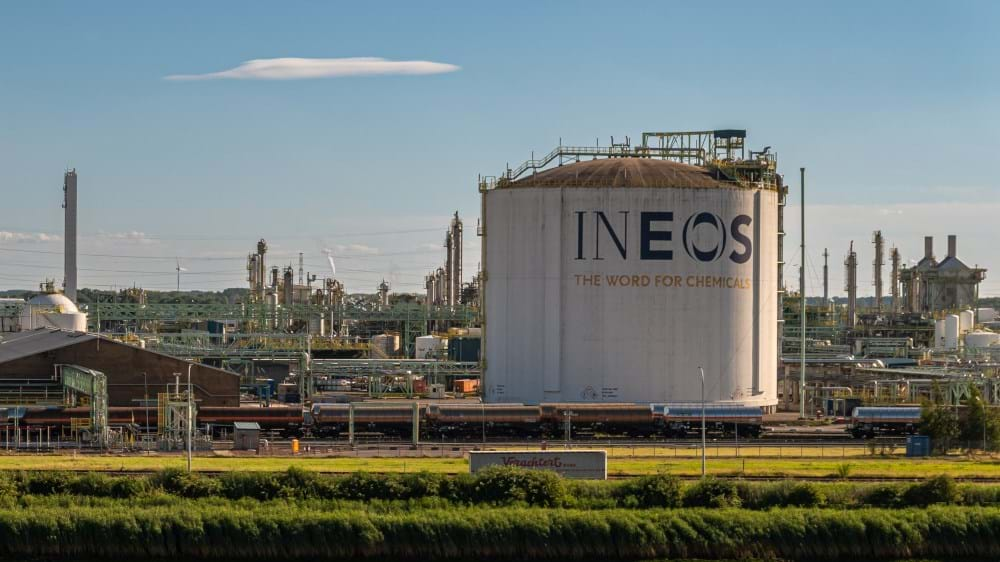INEOS announces further German plant closures months after European chemicals plan published

INEOS has announced plans to shut down its allyls and chlorine production plants in Rheinberg, Germany, marking its latest move in an ongoing pushback against European energy policy. The announcement comes just months after an industrial “action plan” was set out by the European Commission to address problems in the sector.
The closure will impact 175 jobs, taking the total number of workers directly affected by INEOS plant shutdowns announced this year to over 450.
INEOS has long blamed European energy policy on its decisions to shut down plants across the EU and UK, saying the Rheinberg closures are a direct result of “crippling” energy costs and carbon taxes. It also blamed a lack of EU direction in protecting the sector against cheap imports from Asia.
The European Commission is making attempts to address sector problems. In May, European Commission president Ursula von der Leyen hosted a “strategic dialogue” event with industry figures including leaders at BASF, Dow Europe and Solvay. This was followed by publication of the European Commission’s “chemicals industry action plan” in July, which promised to update the compensation scheme that exempts energy-intensive industries from high carbon levies, with a view to extending eligibility to more subsectors such as fertiliser and organic chemicals production. The action plan also promised to propose measures to speed up the environmental permitting process for decarbonisation projects. A spokesperson confirmed to TCE that the Commission is now implementing some of the the measures set out in the plan.
INEOS said at the time that the plan was “too little, too late”, although the company was alone in its flat dismissal, with the German chemical industry association (VCI) describing it as “a start” to addressing the sector’s problems.
INEOS Inovyn – the division that operates the allyl and chlorine plants slated for closure – confirmed that PVC production at Rheinberg will continue as normal. However, it has hinted that the 300 jobs on the site may also be at risk, citing the need for “urgent state support to help cover significant local transitioning costs”.
Stephen Dossett, CEO of INEOS Inovyn, said: “While competitors in the US and China benefit from cheap energy, European producers are being priced out by our own policies and absence of tariff protection. Meanwhile, high-emission imports flood our market unchecked. It’s completely unsustainable and if not immediately addressed will lead to further closures, job losses and increased dependency on other regions for essential materials.”
A European Commission spokesperson said: "We are acutely aware of the pressures facing Europe's chemical industry, from energy prices to the fierce global competition. This is precisely why we adopted the chemicals action plan: to keep the chemicals sector, as the mother of all industries, in Europe."
The spokesperson added: "Our message is clear: Europe is not turning its back on its industry, on the contrary, we are creating the conditions for it to thrive here, on a sustainable and competitive footing."
Closing doors
The European Commission estimates that more than 20 major chemicals production site closures over the past two years have resulted in up to 20,000 job losses. INEOS closures announced this year alone have impacted over 450 workers in Germany, including 279 positions at the company’s phenol and acetone production plant in Gladbeck. This is on top of the 400 jobs lost at the Grangemouth refinery in Scotland, which was jointly owned by INEOS and PetroChina.
INEOS also suspended chloromethane production at its Tavaux facility in France. This decision was blamed on high energy costs in Europe, although the company said it would meet chloromethane demand for existing customers through production at a different European facility in Rosignano, Italy.
Industrial energy prices across Europe have generally remained high since gas prices surged following the outbreak of the war in Ukraine. Although gas prices have since fallen, electricity costs remain high – one of the key issues INEOS has cited in its decision to close multiple plants. David Simmonds, an IChemE Fellow and retired energy professional, echoed those concerns, telling TCE that the pressure of high gas prices “has been replaced by higher US tariffs”.
He added: “It is imperative that EU and the UK quickly address high electricity prices which have not dropped in line with gas prices. Indeed, government goals for electrification will fail unless sensible policies are put in place, as the only beneficiaries will be the US, China and India. Investment in the sector will spur growth and jobs, something which is sadly lacking at the moment.”
INEOS also faces other business pressures. Business Matters reports that INEOS has frozen recruitment across the group as it manages a debt burden of €11bn (US$11.6bn). A significant portion of the debt stems from the €650m investment taken on to expand production at INEOS’s ethylene plant in Antwerp, Belgium.
This story was updated on 08/10/25 after we received a statement from a European Commission spokesperson.
Recent Editions
Catch up on the latest news, views and jobs from The Chemical Engineer. Below are the four latest issues. View a wider selection of the archive from within the Magazine section of this site.




